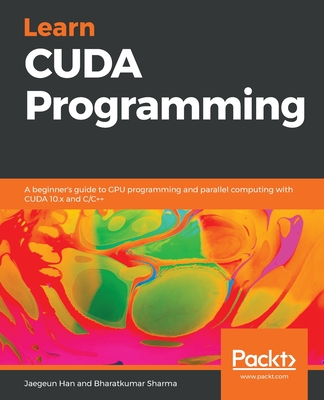Design of FPGA-Based Computing Systems with OpenCL Softcover reprint of the original 1st ed. 2018 Edition
暫譯: 基於FPGA的計算系統設計與OpenCL 軟面再版第1版 2018年版
Waidyasooriya, Hasitha Muthumala, Hariyama, Masanori, Uchiyama, Kunio
- 出版商: Springer
- 出版日期: 2018-08-25
- 定價: $3,500
- 售價: 8.0 折 $2,800
- 語言: 英文
- 頁數: 126
- 裝訂: Quality Paper - also called trade paper
- ISBN: 331988557X
- ISBN-13: 9783319885575
-
相關分類:
FPGA
-
其他版本:
Design of FPGA-Based Computing Systems with OpenCL (Hardcover)
立即出貨 (庫存=1)
買這商品的人也買了...
-
 Linux 驅動程式, 3/e (Linux Device Drivers, 3/e)
Linux 驅動程式, 3/e (Linux Device Drivers, 3/e)$980$774 -
 程式設計師的自我修養-連結、載入、程式庫
程式設計師的自我修養-連結、載入、程式庫$580$458 -
 OpenCL Programming Guide (Paperback)
OpenCL Programming Guide (Paperback)$2,160$2,052 -
 版本控制使用 Git, 2/e (Version Control with Git: Powerful tools and techniques for collaborative software development, 2/e)
版本控制使用 Git, 2/e (Version Control with Git: Powerful tools and techniques for collaborative software development, 2/e)$580$458 -
 電子材料導論
電子材料導論$750$735 -
 Matplotlib Plotting Cookbook (Paperback)
Matplotlib Plotting Cookbook (Paperback)$2,010$1,910 -
 $301OpenCL 異構並行程式設計實戰
$301OpenCL 異構並行程式設計實戰 -
 Vim 實用技巧, 2/e (Practical Vim : Edit Text at the Speed of Thought, 2/e)
Vim 實用技巧, 2/e (Practical Vim : Edit Text at the Speed of Thought, 2/e)$354$336 -
 Git 團隊使用手冊 (Git for Teams: A User-Centered Approach to Creating Efficient Workflows in Git)
Git 團隊使用手冊 (Git for Teams: A User-Centered Approach to Creating Efficient Workflows in Git)$580$458 -
 $403CUDA 高性能並行計算
$403CUDA 高性能並行計算 -
 Git 活用大事典 - 指令速查‧錯誤訊息排除‧職場情境範例詳解
Git 活用大事典 - 指令速查‧錯誤訊息排除‧職場情境範例詳解$560$476 -
 Learn CUDA Programming
Learn CUDA Programming$1,710$1,625 -
 $301Vim 8 文本處理實戰 (Mastering Vim: Build a software development environment with Vim and Neovim)
$301Vim 8 文本處理實戰 (Mastering Vim: Build a software development environment with Vim and Neovim) -
 SOLIDWORKS 零件與組合件培訓教材 <2020繁體中文版>
SOLIDWORKS 零件與組合件培訓教材 <2020繁體中文版>$580$452 -
 SOLIDWORKS 工程圖培訓教材 <2020繁體中文版>
SOLIDWORKS 工程圖培訓教材 <2020繁體中文版>$560$437 -
 IntelFPGA 權威設計指南:基於 QuartusPrimePro19 集成開發環境
IntelFPGA 權威設計指南:基於 QuartusPrimePro19 集成開發環境$1,194$1,134 -
 $352精通 Vim : 用 Vim 8 和 Neovim 實現高效開發
$352精通 Vim : 用 Vim 8 和 Neovim 實現高效開發 -
 $301嵌入式系統基礎與實踐 — 基於 ARM Cortex-M3 內核的 STM32 微控制器
$301嵌入式系統基礎與實踐 — 基於 ARM Cortex-M3 內核的 STM32 微控制器
商品描述
This book provides wide knowledge about designing FPGA-based heterogeneous computing systems, using a high-level design environment based on OpenCL (Open Computing language), which is called OpenCL for FPGA. The OpenCL-based design methodology will be the key technology to exploit the potential of FPGAs in various applications such as low-power embedded applications and high-performance computing. By understanding the OpenCL-based design methodology, readers can design an entire FPGA-based computing system more easily compared to the conventional HDL-based design, because OpenCL for FPGA takes care of computation on a host, data transfer between a host and an FPGA, computation on an FPGA with a capable of accessing external DDR memories.
In the step-by-step way, readers can understand followings:
- how to set up the design environment
- how to write better codes systematically considering architectural constraints
- how to design practical applications
商品描述(中文翻譯)
這本書提供了有關設計基於FPGA的異構計算系統的廣泛知識,使用基於OpenCL(開放計算語言)的高階設計環境,稱為OpenCL for FPGA。基於OpenCL的設計方法論將是發揮FPGA在各種應用中潛力的關鍵技術,例如低功耗嵌入式應用和高性能計算。通過理解基於OpenCL的設計方法論,讀者可以比傳統的HDL(硬體描述語言)設計更輕鬆地設計整個基於FPGA的計算系統,因為OpenCL for FPGA處理主機上的計算、主機與FPGA之間的數據傳輸,以及FPGA上的計算,並能夠訪問外部DDR記憶體。
以逐步的方式,讀者可以理解以下內容:
- 如何設置設計環境
- 如何系統性地編寫更好的代碼,考慮架構約束
- 如何設計實用的應用程序
作者簡介
Waidyasoriya Hasitha Muthumala is an Assistant Professor in the Graduate School of Information Sciences at Tohoku University. He received the BE degree in information engineering, the MS degree in information sciences, and the PhD degree in information sciences from Tohoku University, Japan, in 2006, 2008, and 2010 respectively. His research interests include reconfigurable computing, processor architectures for big-data applications, and high-level design methodology for VLSIs. He is a member of the IEEE.
Masanori Hariyama is a Professor in the Graduate School of Information Sciences at Tohoku University. He received the BE degree in electronic engineering, the MS degree in information sciences, and the PhD degree in information sciences from Tohoku University, Japan, in 1992, 1994, and 1997, respectively. His research interests include real-world applications such as robotics and medical applications, big data applications such as bio-informatics, high-performance computing, VLSI computing for real-world application, high-level design methodology for VLSIs, and reconfigurable computing. He is a member of the IEEE.
Kunio Uchiyama, technical advisor of Hitachi, Ltd., received his BS, MS, and PhD degrees from the Tokyo Institute of Technology. He has worked for the Central Research Laboratory of Hitachi since 1978 on design automation, mainframe computers, microprocessors, multicore processors, and their applications. He led R&D for the commercial SuperH microprocessors from the early 1990s, and he was awarded Japan's national Medal of Honor with the Purple Ribbon in 2004 for his contribution to the development of commercial high-performance, low-power microprocessors. He also led the New Energy and Industrial Technology Development Organization project in Japan on heterogeneous multicore technologies from 2007 to 2010. He was a guest editor of IEEE Micro in 2005 and served as a general chair of the Asia and South Pacific Design Automation Conference sponsored by IEEE CAS/CEDA in 2015. He has also been a vice chair of the IEEE Symposium on Low-Power and High-Speed Chips, sponsored by the IEEE Computer Society since 2008. He is a member of the IEEE Computer Society, Solid-State Circuits Society, and the Institute of Electronics, Information and Communication Engineers (IEICE). He is a Fellow of IEEE and IEICE, and is a member of Board of Governors of IEEE Computer Society.
作者簡介(中文翻譯)
Waidyasoriya Hasitha Muthumala 是東北大學資訊科學研究所的助理教授。他於2006年、2008年和2010年分別獲得日本東北大學資訊工程學士學位、資訊科學碩士學位和資訊科學博士學位。他的研究興趣包括可重構計算、大數據應用的處理器架構,以及VLSI的高階設計方法學。他是IEEE的會員。
Masanori Hariyama 是東北大學資訊科學研究所的教授。他於1992年、1994年和1997年分別獲得日本東北大學電子工程學士學位、資訊科學碩士學位和資訊科學博士學位。他的研究興趣包括機器人技術和醫療應用等現實世界應用、大數據應用如生物資訊學、高效能計算、針對現實世界應用的VLSI計算、高階設計方法學以及可重構計算。他是IEEE的會員。
Kunio Uchiyama 是日立有限公司的技術顧問,他在東京工業大學獲得學士、碩士和博士學位。自1978年以來,他一直在日立中央研究所工作,專注於設計自動化、大型主機、微處理器、多核心處理器及其應用。他從1990年代初期開始主導商用SuperH微處理器的研發,並因其對商用高效能、低功耗微處理器的貢獻於2004年獲得日本國家紫綬勳章。他還於2007年至2010年期間主導了日本新能源與產業技術開發機構的異構多核心技術專案。他在2005年擔任IEEE Micro的客座編輯,並於2015年擔任由IEEE CAS/CEDA主辦的亞太設計自動化會議的總主席。自2008年以來,他還擔任IEEE計算機學會主辦的低功耗與高速晶片研討會的副主席。他是IEEE計算機學會、固態電路學會及電子資訊通信學會(IEICE)的會員。他是IEEE和IEICE的院士,並且是IEEE計算機學會理事會的成員。



















